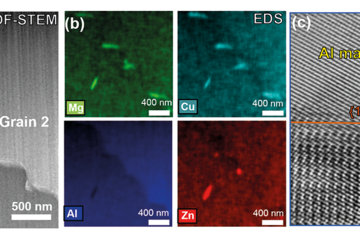All genres
1.
Journal Article
Supraduktile und hochfeste Leichtbaustähle für den zukünftigen Fahrzeugbau. Konstruktion 6, pp. IW6 - IW7 (2008)
2.
Conference Paper
Innovative Werkstoffe für die fortgeschrittene Schmiedetechnologie. Int. Konf. Neuere Entwicklungen in der Massivumformung, Stuttgart, Germany, May 12, 2009 - May 13, 2009. Int. Konf. Neuere Entwicklungen in der Massivumformung, pp. 289 - 318 (2009)
3.
Talk
Development, Microstructures and Properties of Advanced High-Strength and Supra-Ductile Light-Weight Steels. International Conference on Processing and Manufacturing of Advanced Materials -Thermec 2009, Berlin, Germany (2009)
4.
Talk
Innovative Materials for Advanced Forming Technology. International Conference on New Developments in Forging Technology, Stuttgart, Fellbach, Germany (2009)
5.
Talk
Mechanical properties of high manganese steels - structures, plasticity, strength. Iberomet Congreso Iberoamericano de Metalurgica y Materiales, Cartagena de Indias, Colombia (2008)
6.
Talk
Das Potential von hochfesten und supraduktilen Fe–Mn–Al–Si–C Stählen für den zukünftigen Karosserieleichtbau - Stand der Technik und Entwicklungstrends. WAMM World Automotive Materials Meeting 2008, Bad Nauheim/Frankfurt, Germany (2008)
7.
Talk
Mechanical properties of high manganese steels - structures, plasticity, strength. Tratermat 2008, Valencia, Spain (2008)
8.
Talk
Höherfeste und supraduktile Leichtbaustähle auf der Basis Fe-Mn(Al, Si, C). Workshop Panzerstahl des Wehrwissenschaftlichen Instituts der Bundeswehr, Erding, Germany (2007)
9.
Talk
Entwicklung und Eigenschaften ultrahochfester und supraduktiler Stähle für den Fahrzeugbau. Clausthal Industriekolloquium Sonderforschungsbereich 675, Clausthal (2007)
10.
Talk
High carbon light-weight Fe-Mn-TRIP/TWIP-steels with improved formability and strength. IOM Materials Congress 2006, London, UK (2006)
11.
Talk
Improving the fomability and strength of light-weight Fe-Mn-Al-Si steels. 3rd Discussion Meeting on the Development of Innovative Iron Aluminium Alloys, Mettmann, Germany (2006)
12.
Poster
High carbon lightweight iron-manganese-TRIP/TWIP-steels with improved formability and strength. 17. International Federation for Heat Treatment and Surface Engineering (IFHTSE), Kobe, Japan (2008)
13.
Poster
Metallphysikalische Verformungsmechanismen hoch manganhaltiger austenitischer Stähle. Materialographie 2008 - 42. Metallographie-Tagung, Jena, Germany (2008)
14.
Poster
Mechanical properties of high carbon lightweight Mn-Al-Si TRIP/TWIP steels. EUROMAT 2007, Nürnberg, Germany (2007)
15.
Poster
Effect of multiaxial stress states on the stress-strain behaviour of deep drawing steels. Euromat 2007, Nürnberg, Germany (2007)
16.
Poster
High carbon light-weight Fe-Mn-TRIP/TWIP-steels with improved formability and strength. 7th European Symposium on Martensitic Transformation and Shape Memory Alloys, Bochum, Germany (2006)
17.
Poster
Higher content of carbon improves the formability and strength of light-weight Fe–Mn–Al–Si TRIP-steels. European Congress on Advanced Materials and Processes, Prague, Czech Republic (2005)










